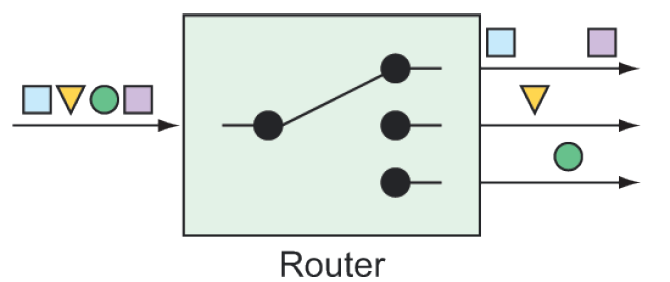10.2.4 Routers
Routers, based on some routing criteria, allow for branching in an integration flow, directing messages to different channels (see figure 10.5).

Figure 10.5 Routers direct messages to different channels, based on some criteria applied to the messages.
For example, suppose that you have a channel named numberChannel through which integer values flow. And let’s say that you want to direct all messages with even numbers to a channel named evenChannel, whereas messages with odd numbers are routed to a channel named oddChannel. To create such a routing in your integration flow, you can declare a bean of type AbstractMessageRouter and annotate the bean with @Router, as shown next:
@Bean
@Router(inputChannel="numberChannel")
public AbstractMessageRouter evenOddRouter() {
return new AbstractMessageRouter() {
@Override
protected Collection<MessageChannel>
determineTargetChannels(Message<?> message) {
Integer number = (Integer) message.getPayload();
if (number % 2 == 0) {
return Collections.singleton(evenChannel());
}
return Collections.singleton(oddChannel());
}
};
}
@Bean
public MessageChannel evenChannel() {
return new DirectChannel();
}
@Bean
public MessageChannel oddChannel() {
return new DirectChannel();
}The AbstractMessageRouter bean declared here accepts messages from an input channel named numberChannel. The implementation, defined as an anonymous inner class, examines the message payload, and, if it’s an even number, returns the channel named evenChannel (declared as a bean after the router bean). Otherwise, the number in the channel payload must be odd, in which case, the channel named oddChannel is returned (also declared in a bean declaration method).
In Java DSL form, routers are declared by calling route() in the course of a flow definition, as shown here:
@Bean
public IntegrationFlow numberRoutingFlow(AtomicInteger source) {
return IntegrationFlows
...
.<Integer, String>route(n -> n%2==0 ? "EVEN":"ODD", mapping -> mapping
.subFlowMapping("EVEN", sf -> sf
.<Integer, Integer>transform(n -> n * 10)
.handle((i,h) -> { ... })
)
.subFlowMapping("ODD", sf -> sf
.transform(RomanNumbers::toRoman)
.handle((i,h) -> { ... })
)
)
.get();
}Although it’s still possible to declare an AbstractMessageRouter and pass it into route(), this example uses a lambda to determine whether a message payload is odd or even. If it’s even, then a String value of EVEN is returned. If it’s odd, then ODD is returned. These values are then used to determine which submapping will handle the message.
